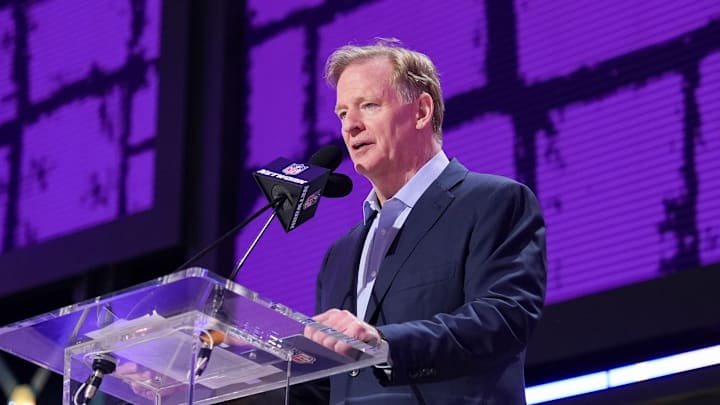While Roger Goodell has overseen arguably the most successful era in NFL history, he will eventually pass the torch. His contract is set to expire in 2027, and he’s approaching 70 years old. For context, his predecessor, Paul Tagliabue, stepped down at age 66, the same age Goodell is now. With that in mind, it would make sense for the NFL to start planning for its next commissioner.
One natural successor has long been veteran NFL executive Brian Rolapp, who has led many of the league’s major business initiatives, including television rights deals. However, that potential plan may have taken a hit on Thursday. According to ESPN’s Adam Schefter and Seth Wickersham, a memo announced that Rolapp will become the new CEO of the PGA Tour, which has been looking to fill the position since December.
Rolapp has played a key role in expanding the NFL’s media rights deals, helping the league steal the spotlight from the NBA on Christmas with games on Netflix, bring Thursday Night Football and Black Friday games to Amazon Prime, and most recently, land games on YouTube. In addition to his streaming successes, Rolapp has maintained strong partnerships with traditional cable networks. That track record has made him highly sought after, but it doesn’t necessarily rule out a return to the NFL.
Rolapp could return with more experience, but the NFL still needs a clear succession plan
If Goodell stays on past the end of his contract, it would delay Rolapp’s opportunity to become NFL Commissioner. In the meantime, stepping in as CEO of the PGA Tour makes sense, as it’s a high-profile role that keeps him in the spotlight while the NFL figures out who will ultimately take over the Shield.
Rolapp can lead the PGA Tour through its current uncertainty, which has persisted since LIV Golf's presence pushed the Tour to increase tournament payouts. Beyond that, the longtime executive brings the expertise to help expand the brand, just as he did with the NFL, by attracting more viewers through strategic distribution and creative content initiatives, all while strengthening the organization’s bottom line.
At the same time, while Rolapp could still return to the NFL one day to run the league, the odds of that happening have likely decreased, especially if the owners want a clear succession plan for the aging Goodell. It’s harder now to bank on someone outside the league making a comeback, unless there’s some arrangement in place for Rolapp to gain outside experience and return when the timing is right.
However, if Goodell is indeed on track for one final contract extension, it may be time for both him and the NFL to shift focus and start developing a long-term succession plan to ensure the league’s continued success over the next two decades. More immediately, though, someone will need to step into Rolapp’s role in the business arena. Given his significant influence over the league’s media rights deals, it’ll be interesting to see whether the NFL sticks with a similar vision or takes things in a new direction.
